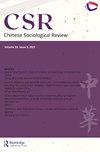Mutual dependence and selective coercion: corporate environmental investment among Chinese private firms
IF 1.4
2区 社会学
Q2 SOCIOLOGY
引用次数: 4
Abstract
Abstract Neo-institutionalism suggests unified coercion which overlooks the mutual dependent relationship between state and businesses in developmental societies. This study incorporates the insight of mutual dependence, and proposes a model of selective coercion to explain how the state coerces Chinese private firms for environmental investment. Findings reveal that the local state is more likely to coerce firms that are more dependent on the state through political connections and less likely to coerce those which are highly important to local tax revenues and those which are substantially costly for regulation enforcement. Provinces that are more dependent on tourism economy exert harder coercion on firms, whereas those that place higher priority on economic development exert lighter coercion on firms. This study contributes to the literature of the neo-institutionalist theory and corporate environmental behavior.相互依赖与选择性胁迫:中国民营企业的环境投资
摘要新制度主义主张统一胁迫,忽视了发展社会中国家和企业之间的相互依赖关系。本研究结合了相互依赖的观点,提出了一个选择性胁迫模型来解释国家如何胁迫中国私营企业进行环境投资。调查结果显示,地方政府更有可能通过政治关系胁迫那些更依赖国家的公司,而不太可能胁迫那些对地方税收非常重要的公司和那些执法成本高昂的公司。更依赖旅游经济的省份对企业施加更大的胁迫,而那些更重视经济发展的省份对公司施加更轻的胁迫。本研究有助于新制度主义理论和企业环境行为的研究。
本文章由计算机程序翻译,如有差异,请以英文原文为准。
求助全文
约1分钟内获得全文
求助全文

 求助内容:
求助内容: 应助结果提醒方式:
应助结果提醒方式:


